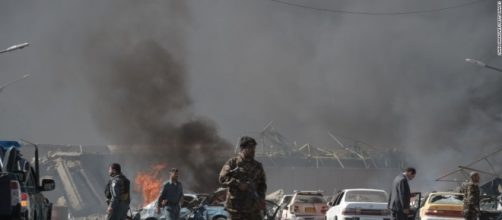A suicide bomb exploded in Kabul in the diplomatic quarter which is a location that is believed to be secure because of the presence of foreign embassies, along with the presidential palace. The incident happened during the morning rush hour and left at least 90 people dead with another 400 wounded.
The blast took place a few days into the Muslim holy month of Ramadan, and the obvious intention was to create panic among the innocents.
The events that led to the bombing
CNN reports that the bomb exploded in the diplomatic quarter near the German Embassy.
Capt. Bill Salvin, a U.S. military spokesman in Kabul, has revealed that a checkpoint had not allowed the truck in which the bomb was concealed, to get closer to the diplomatic quarter.
The Suicide Bomb detonated near the German Embassy which is in one of the busiest parts of town and has supermarkets and shops in the vicinity. The explosion was in the close proximity of western embassies which is believed to be the most fortified part of the city. Access is not easy and people have to pass through several checkpoints to reach the destination.
The Taliban has, in a statement, denied responsibility for the attack and no group has yet claimed it but the Afghanistan's intelligence service believes it to be the handiwork of the Haqqani Network.
The U.S. involvement in Afghanistan
The U.S. Embassy has concluded that it was not the intended target of the bombing in the diplomatic quarter. However, some U.S. citizens who work in the U.S. embassy as contractors have suffered injuries.
President Donald Trump called President Ghani to express his condolences while U.S. Secretary of State Rex Tillerson has pledged continued U.S. support to the Afghan government.
The Pentagon is considering a proposal to send additional troops to Afghanistan to augment the existing strength. At present, there are about 8,400 US troops positioned in the country and most of them are detailed to train and advise Afghan troops while about 2,000 US service members are earmarked to participate in a counterterrorism mission against terror groups like the al Qaeda and ISIS.
U.S. troops have been in Afghanistan for more than 15 years and the Afghan government and coalition allies are trying to come to terms with terror groups that include the Taliban and ISIS. The numbers of U.S. soldiers have reduced over the years but a skeletal formation remains. Their task is to train the local police on various aspects of counter measures so that they can work independently and with more confidence.


